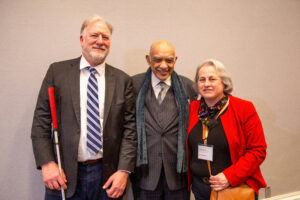Dr. Lenneal Henderson is an alum of The Experiment in International Living and has also provided briefings on federalism for the International Visitor Leadership Program (IVLP) for several decades. In March, he received a 2024 Citizen Diplomat Award from Global Ties U.S. at its national meeting in Washington, DC. The award honors individuals and institutions for outstanding achievements that advance international understanding and global engagement.
Specifically, Dr. Henderson was recognized for his dedication to making international exchange available to everyone, especially African American, rural, and other historically under-represented students. In addition to providing briefings, he played a key role in World Learning’s 2022 IVLP project “Developing University Partnerships–Connecting African Universities with HBCUs” by hosting the participants’ visit to Virginia State University, connecting them to students, faculty, and administrators, and organizing meetings with local elected officials and community leaders. Dr. Henderson is a dean in the College of Humanities and Social Sciences at Virginia State University, a historically Black university.
“He embodies the lifelong impact and benefits that international exchanges can have and demonstrates the generosity and energy that alumni bring to sharing those benefits with others,” said Ann Driscoll, an IVLP program manager at World Learning who nominated Dr. Henderson for the award.
We spoke to Dr. Henderson after receiving the award about citizen diplomacy and its importance.

Left to right, World Learning Senior Program Officer Anthony Zaun, Dr. Lenneal Henderson, World Learning Program Manager Ann Driscoll
The evening of the awards was themed “Diplomacy in Action,” and Global Ties U.S. noted it was celebrating “citizen diplomacy in strengthening international alliances and communities at home.” How would you define the term citizen diplomacy?
Citizen diplomacy is the unofficial behavior of citizens who embrace personal and cultural exchanges and interpersonal relationships as a method of constructive international relations. This often involves reaching an agreement on mutually essential values, goals, and strategies and a willingness to sustain relationships beyond initial encounters.
Citizen diplomacy is essential as a resource to official diplomacy and fundamental to human success across the planet, as well as respect for all life forms.
How have you worked in your career to strengthen international alliances and communities at home?
I encourage travel to emphasize learning with diverse groups so that the diversity of the traveling group drives a motivation to embrace and learn from those encounters from other nations.
I have taught international economics and statistics in Malaysia, Singapore, Hong Kong, and South Korea, and I conduct briefings on federalism and the United States in India, South Africa, Kenya, Nigeria, Tanzania, the Netherlands, Chile, Zimbabwe, and Kosovo as part of the U.S. Speaker Program and IVLP.
I also collaborate with the Indian Institute of Technology, the Nitze School of Advanced International Studies, the Coalition for Effective Democracy (South Africa), and the Mimosa International Foundation of America.
Do you have any suggestions for someone who might want to actively engage in foreign affairs as a citizen? Where might they start?
I would suggest they identify and learn about their sister city; join a World Affairs Council; identify and reach out to neighborhoods with citizens or immigrants from other nations; or link up with your faith institution’s global or international offices, initiatives, or programs.


